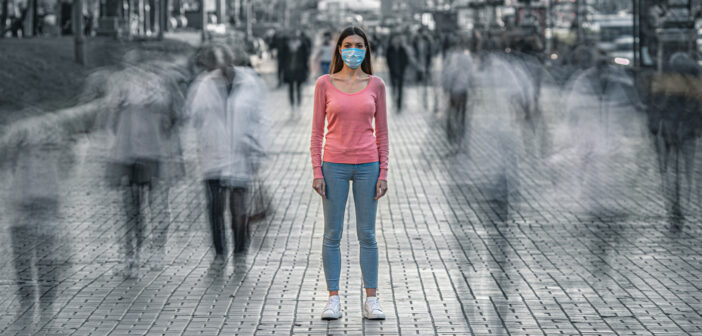As the pandemic rages on, new outcomes of COVID-19 continue to be uncovered. The complications of the virus and our methods of combating it are negatively affecting not only our physical health, but our mental health, as well.
New research has found that nearly one in five people diagnosed with COVID-19 is subsequently diagnosed with a psychiatric disorder such as anxiety, depression or insomnia within three months. Post-hospitalized patients who have had COVID-19 are reporting distressing dreams detailing their harrowing hospital experiences. Thoughts of death and loss are common in those stricken, with some who have undergone a long battle with the disease reporting foggy minds and memory problems.
And, it’s not just the disease that is adding to our mental struggles. The act of quarantining, social distancing and masking up can also have a negative effect. We have been cooped up, tired and scared for nearly a year and people are beginning to break down, suffer depression and anxiety and throw caution to the wind. Dubbed “COVID Fatigue,” even typically healthy people are struggling to cope. The effect is worse for those already struggling with mental health. The isolation and constant turmoil are increasing their distress and leading to hospitalization, increased substance abuse and self-harm.
The pandemic is exhausting us and feelings of frustration and disillusionment are common. The whole world is stressed. Throughout it all, remember that you are not experiencing this stress alone. Most of us have experienced some of the following:
- Fear and worry about loss of family, job or services
- Changes in sleeping and eating
- Difficulty concentrating
- Worsening of chronic health problems
- Increased use of tobacco, alcohol or drugs
Each is an indication of COVID Fatigue and prolonged stress reaction. Some ways to reduce the stress we are feeling during this pandemic are:
1. Exercise.
Working out/movement is the No. 1 best thing for coping with stress. Even a simple walk helps release endorphins and gets adrenaline out when frustration builds. It also increases physical health and self-esteem.
2. Mindfulness.
It’s a buzzword, but a helpful one. Just thinking and reasoning about the situation can create a sense of control. Uncertainty breeds fear and being in control can alleviate uncertainty, to an extent. Remember, we are all in this together – you are loved, and you have the power to succeed.
3. Ditch the Media.
Cut down on your exposure to negative news about the world. Limit it to an hour a day. Instead, surround yourself with positivity and positive stories. Those experiencing COVID Fatigue can be desensitized to the warnings they receive and put themselves or others in harm’s way. A constant barrage of pandemic media coverage increases the chances of desensitization.
4. Connect with others in new ways.
One of the biggest causes of COVID Fatigue and mental disorders is isolation. Find a way to speak to and spend time with friends and family using technology, if possible. If you are having trouble setting up a meeting online, ask a friend who is more tech-savvy for help. If you are missing the people in your book club, for example, set up a virtual meeting with other members to talk about all the books you read during quarantine.
This pandemic has gone on for almost a year and feelings of frustration, anxiety and loneliness are understandable. At this point, everyone wishes for it to end and for things to go back to normal; but that won’t happen until we collectively work toward it. Hang in there, and don’t let COVID Fatigue get you down. There is light at the end of the tunnel.
If you feel you are being overwhelmed by fear, anxiety, or are having suicidal thoughts, please seek help by calling:
· Disaster Distress Hotline 1.800.985.5990
· National Suicide Prevention Lifeline 1.800.273.8255
If you, or someone you know, are dealing with physical abuse, please seek help by calling:
· National Domestic Violence Hotline 1.800.799.7233
· National Child Abuse Hotline 1.800.422.4453
New research has found that nearly one in five people diagnosed with COVID-19 is subsequently diagnosed with a disorder such as anxiety, depression or insomnia within three months.
References
CDC. (2020). Pandemics can be stressful. CDC. Retrieved from cdc.gov/coronavirus/2019-ncov/daily-life-coping/managing-stress-anxiety.html
Northwestern Medicine. (2020). Do you have COVID-19 caution fatigue? Northwestern Medicine. Retrieved from nm.org/healthbeat/healthy-tips/emotional-health/do-you-have-covid-19-caution-fatigue
UC Davis Health. (2020). “Covid fatigue” is hitting hard. UCDavis Health. Retrieved from health.ucdavis.edu/health-news/newsroom/covid-fatigue-is-hitting-hard-fighting-it-is-hard-too-says-uc-davis-health-psychologist/2020/07
Wamsley, L. (2020). After Covid diagnosis, nearly 1 in 5 are diagnosed with mental disorder. NPR. Retrieved from npr.org/sections/coronavirus-live-updates/2020/11/11/933964994/after-covid-diagnosis-nearly-1-in-5-are-diagnosed-with-mental-disorder








